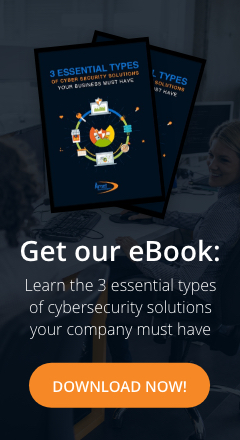One of the biggest technology challenges faced by today’s businesses is keeping data safe from constantly expanding cyberthreats. Matters used to be simpler when all computing workloads were handled in the office, but that’s far less likely to be the case now that we’ve entered the age of mobility. The problem lies in the fact that you have no control over the networks that your remote or mobile workforce are connecting through. From coffee shops to coworking environments to home networks, there’s a whole raft of potential security issues that come with the freedom of mobility and cloud computing.
What Is a Virtual Private Network (VPN)?
A VPN serves as a gateway between an internet-connected device and the internet itself. In many ways, an enterprise-grade VPN functions a bit like a firewall since it keeps your data safe no matter which device or network you’re connecting through. For example, you might prevent cloud-hosted business apps and data from being accessible to anyone who doesn’t connect through your corporate VPN server. This makes it possible to apply the same level of internet security that you have in your private corporate network, even if people are connecting through an unsecured WiFi network. Furthermore, business VPNs automatically encrypt all outgoing data so that it remains unusable even if it ends up being exposed to a man-in-the-middle attack.
Preventing Costly Data Breaches
Security experts are constantly advising people to avoid connecting to the internet through an unsecured wireless network, such as those you often find in airports and other public places. Sure, it might be convenient not to have to ask someone for the password, but it also means that anyone else can connect. In the case of larger city-wide public networks, the risk increases exponentially. That’s because, with the right software, a hacker can intercept data in transit between the device and the router or wireless range extender. As such, using an unsecured network for accessing online banking systems, corporate applications, and any other system that handles sensitive data is a recipe for disaster… unless you connect through a suitable VPN.
Preserving Your Anonymity
It might come as a shock to some, but your internet service provider knows exactly which websites you’re visiting and when. With a public network, you have even less control over who has access to this data. Like it or not, browsing activities are always being monitored by governments, marketing agencies and, of course, cybercriminals seeking to exploit poor security standards. While any modern business should ideally be transparent in its actions, you still owe it to your customers to ensure that they will stay in control of their own data. After all, one of the most severe consequences of a data breach is irreparable damage to your brand’s reputation.
Accessing the Internet Freely
The internet gives even the smallest businesses the potential for global expansion, but it’s not always easy. For example, getting online in the conventional way means that websites and online services will often provide content based on your physical location, which may be deduced from your IP address. That’s why certain websites and services are unavailable in certain countries. However, when you connect via a VPN, the internet will think you’re connecting from the location hosted by the VPN, which can be very useful for things like localized research and marketing as well as for accessing content that might be blocked or modified in your region. If employees regularly travel abroad for work, the ability to stay in the US, as far as internet access is concerned, can be tremendously beneficial.
Arnet helps organizations in the Columbus area get set up for future success. If you’re looking for a smarter way to use technology in your business, get in touch today.

